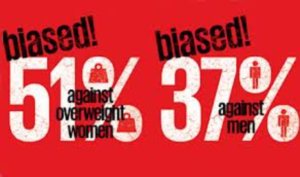People Management Finds Widespread HR Bias against Men and Overweight Women

One of the more surprising discoveries of the survey was the extent of prejudice of men against men. Nearly 16 percent of male HR professionals expressed an anti-male bias where 0.5 percent of women demonstrated an anti-female bias. Also shocking was the finding that 7 percent of respondents showed a bias against people with disabilities with 25 percent demonstrating a strong or very strong prejudice against them.
The one positive aspect uncovered by the survey was that almost 75 percent of participants had no bias against age though there was prejudice, especially towards candidates over the age of 55. In fact, 5 percent of respondents revealed a strong bias against older candidates compared to 1 percent against people under 25.
Dr. Pete Jones, author of the test, stated that, “It’s an annoying fact that you don’t have to believe in a stereotype to be influenced by it. I’m a fat white bloke and I know that lots of people think that fat, white blokes are sexist and racist. If they know I’m an ex-policeman that makes it even worse.” He continued. “The problem is that the mental resources I am using in worrying about how people might see me are the same resources I need for whatever task I am doing, and for my own bias control.”

